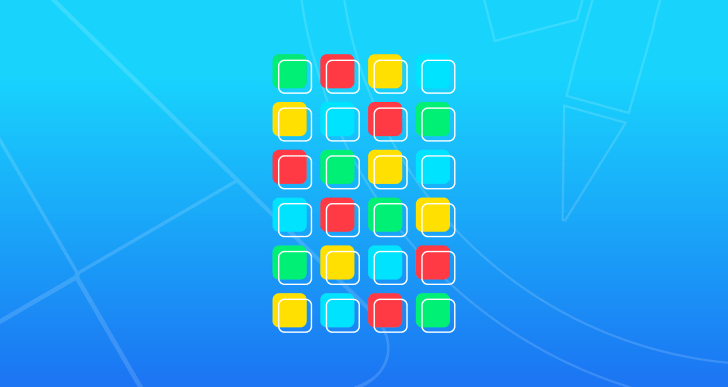Welcome back to This Week in Apps, the Extra Crunch series that recaps the latest OS news, the applications they support and the money that flows through it all.
The app industry is as hot as ever, with a record 204 billion downloads and $120 billion in consumer spending in 2019. People are now spending 3 hours and 40 minutes per day using apps, rivaling TV. Apps aren’t just a way to pass idle hours — they’re a big business. In 2019, mobile-first companies had a combined $544 billion valuation, 6.5x higher than those without a mobile focus.
In this Extra Crunch series, we help you keep up with the latest news from the world of apps, delivered on a weekly basis.
This week we’re continuing to look at how the coronavirus outbreak is impacting the world of mobile applications, including the latest news about COVID-19 apps, Facebook and Houseparty’s battle to dominate the online hangout, the game that everyone’s playing during quarantine, and more. We also look at the new allegations against TikTok, the demise of a popular “Lite” app, new apps offering parental controls, Telegram killing its crypto plans and many other stories, including a hefty load of funding and M&A.
Headlines
Contact tracing and COVID-19 apps in the news
- Global: WHO readies its coronavirus app for symptom-checking and possibly contact tracing. A WHO official told Reuters on Friday the new app will ask people about their symptoms and offer guidance on whether they may have COVID-19. Information on testing will be personalized to the user’s country. The organization is considering adding a Bluetooth-based, contact-tracing feature, too. A version of the app will launch globally, but individual countries will be able to use the underlying technology and add features to release their own versions. Engineers from Google and Microsoft have volunteered their time over the past few weeks to develop the app, which is available open-source on GitHub.
- U.S.: Apple’s COVID-19 app, developed in partnership with the CDC, FEMA and the White House, received its first major update since its March debut. The new version includes recommendations for healthcare workers to align with CDC guidelines, best practices for quarantining if you’ve been exposed to COVID-19 and new information for pregnancy and newborns.
- India: New Delhi’s contact-tracing app, Aarogya Setu, has reached 100 million users out of India’s total 450 million smartphone owners in 41 days after its release, despite privacy concerns. The app helps users self-assess if they caught COVID-19 by answering a series of questions and will alert them if they came into contact with someone who’s infected. The app has come under fire for how it stores user location data and logs the details for those reporting symptoms. The app is required to use Indian railways, which has boosted adoption.
- Iceland: Iceland has one of the most-downloaded contact-tracing apps, with 38% of its population using it. But despite this, the country said it has not been a “game-changer” in terms of tracking the virus and only worked well when coupled with manual contact tracing — meaning phone calls that asked who someone had been in contact with. In addition, the low download rate indicates it may be difficult to get people to use these apps when they launch in larger markets.
Consumer advocacy groups say TikTok is still violating COPPA
Image Credits: TechCrunch
TikTok (Musical.ly) paid a $5.7 million fine in 2019 in a settlement with the FTC for its violation of U.S children’s privacy law, COPPA. But this week, a coalition of 20 consumer advocacy groups are again calling on the FTC to investigate whether or not TikTok has fully come into compliance. The groups claim the app is seeing a surge of usage from under-13 kids during quarantine and is continuing to collect kids’ information without parents’ consent. The groups also allege that TikTok has failed to delete personal information previously collected from children.
One of the groups’ main complaints appears to be that TikTok’s age gate is easily bypassed by using a fake birth date. But age gates are used across the web to verify whether someone is old enough to view a website for alcohol or tobacco products, or even online pornography. They are arguably easy to bypass, but they’re also considered to be legal in a variety of use cases. Plus, it’s unclear how many of the kids “lying about their age” are doing so with a parent’s permission. More concerning to this parent, if I’m being honest, is the fact that TikTok would not respond to my repeated customer support inquiries to remove an old phone number from an account that continually allows a confused child user to log in and post her own videos.
Slack rolls out new apps on iOS and Android
Following its desktop update in March, Slack this week rolled out new versions of its mobile apps for iOS and Android. The apps introduce new navigation icons at the bottom, a new compose button for sending messages quickly and swipe gestures (right for workspaces, left for viewing the last channel or direct message). The company’s goal with its updates is to make its apps easier to use and navigate as the company faces growing competition from Microsoft Teams, especially as everyone moves to work from home during the pandemic.
Houseparty expands into co-watching of live events
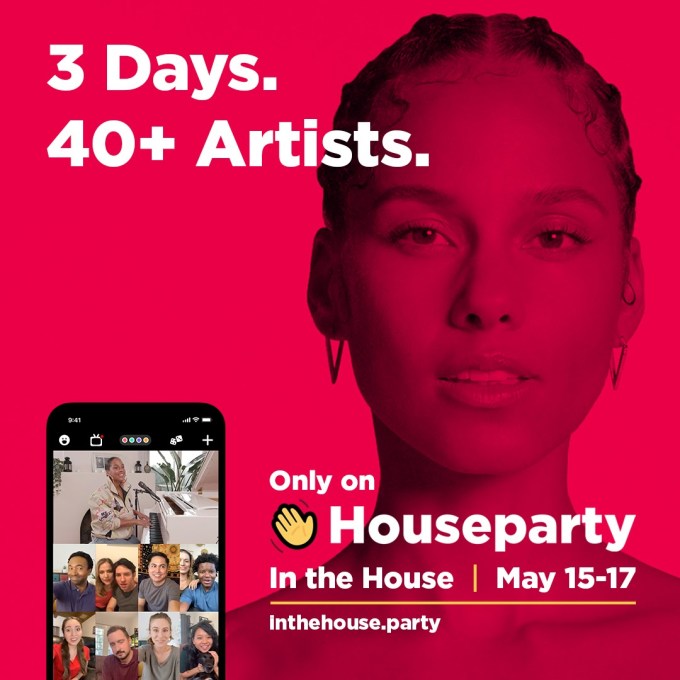
Houseparty, the video chat app that’s seen a surge of growth during quarantine, is preparing to expand in a new direction: co-watching live video with friends. The company on Friday is launching its first experiential event series called In the House, which will feature more than 40 celebrities who will dance, talk, cook, sing, work out and more, over the course of three days.
Participating celebs include: Alicia Keys, DaBaby, Bad Bunny, José Andrés, Christina Tosi, Cam Newton, Terry Crews, Derek Hough, Addison Rae, Katy Perry, John Legend, David Blaine, Lindsey Harrod, Gabi Butler, Snoop Dogg, CHVRCHES, Dua Lipa, Zooey Deschanel, Sarah Michelle Gellar, JB Smoove, 2 Chainz, Miguel, Robin Arzon, Jeremy Fall, Jalaiah, Roy Choi, Chef Mike and Neil Patrick Harris, to name a few.
Friends can watch the live content in a group chat together, thanks to Houseparty’s new video player that sits above friends’ faces.
The company said it sees the event as the first of many live co-watching experiences still to come, positioning itself as more than just a group chat app, but a way to actually interact with others while watching live content.
Facebook launches Houseparty competitor Messenger Rooms to a global audience
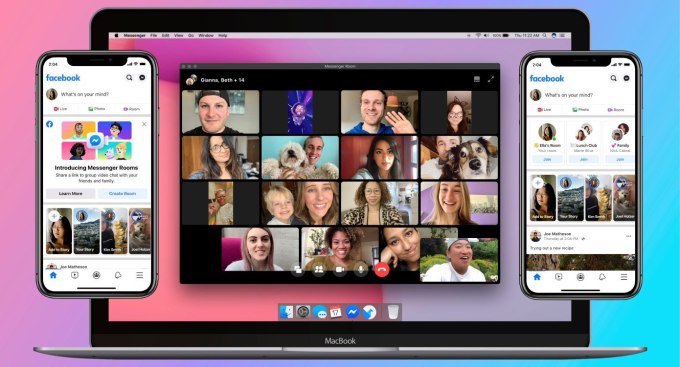
Following Facebook’s April announcement of its drop-in video chat Rooms, the company this week launched Messenger Rooms worldwide. The app is a direct competitor to Houseparty as well as a way to regain market share it may have lost to apps like Zoom and Google Meet during the coronavirus quarantine. The app lets you create a room which then alerts others in the news feed or send a push notification to friends. Others will also soon be able to join and initiate Messenger Rooms group calls from inside Instagram DMs, WhatsApp, and Portal — a sign that Facebook sees a large enough threat from the growth of video chat to throw its entire company’s product line at the problem.
DJ app works around the Spotify ban
In March, Spotify said it was revoking support for all third-party DJ apps, which caused major disruption as DJs had to move over their playlists and tracks to other services. That support ends on July 1. One of the impacted apps, Pacemaker, has come up with a new plan to adapt to the change, announcing this week that it’s doing its own deals for music licensing. The company in a blog post said:
For a long time we’ve been looking at how to bring the Pacemaker experience to more users, and it’s now clear that the only viable way forward is by licensing music directly into Pacemaker. We haven’t started music licensing before now as it is a daunting task for even the most well versed and something that needs absolute commitment, but we’ve now been given the perfect reason to do so.
We’re working on licensing a deep catalogue based on the tracks that are used in Pacemaker mixtapes. This will ensure that the majority of the hundreds of thousands of mixtapes in Pacemaker that our users have invested so much time and energy into will continue to work. There will be a few tracks missing occasionally, but should this happen, our AI will step in and mix the neighbouring tracks together, smoothing the experience. And we’re going to continue our licensing efforts, filling the gaps.
In other words, by shutting off API access to DJ apps, Spotify just created a new competitor.
Spotify improves parental controls in its new Kids app
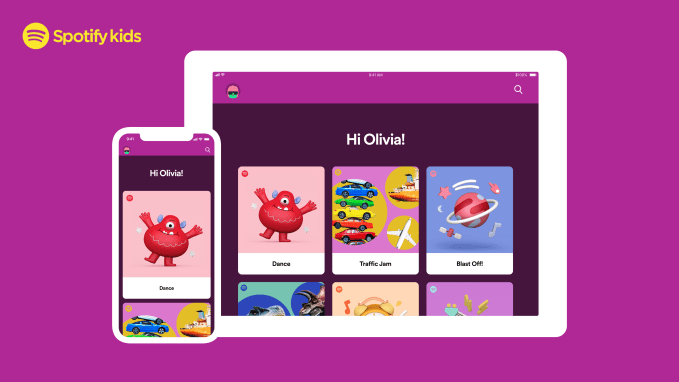
Spotify this week expanded the capabilities of its parental controls on its Spotify Kids app, aimed at children three and older on a parent’s Spotify Premium Family plan. The app launched in the U.S. in March and is live elsewhere in select global markets. Before, parents could only select whether the child was directed to the experience for younger or older children. Now, they’ll be able to specifically block content from their child’s account when accessing the child’s listening history.
The app represents Spotify’s attempt to convince more people to subscribe to its most expensive plan, Spotify Premium Family. It’s a big bet, however, as the kids’ experience isn’t something launched in Spotify’s main app, but a separate application. To curate the kids’ content, Spotify also employs editors who hail from Nickelodeon, Disney, Discovery Kids, Universal Pictures and other brands in kids’ entertainment.
It’s too early to determine if this bet is paying off, as the U.S. version hasn’t even been around for two months. But if successful, the strategy could prove advantageous, just like it did for streaming services that realized that adding kids’ content would get parents to subscribe.
Huawei finds a loophole to ship phones with Google Apps
Huawei has come up with a loophole that allows it to keep shipping Android phones with Google apps, despite the Trump administration’s ban blocking U.S. companies from doing business with the Chinese company. Because the company is not allowed to ship new phones with Google apps, it’s instead just re-releasing old ones, Ars Technica reported. This week, the company said it was bringing back the Huawei P30 Pro as the “Huawei P30 Pro New Edition.” It has already re-launched the P30 Lite as the “P30 Lite New Edition.” Both are from March 2019, but they come with Google apps, which allows Huawei to maintain its business outside China.
Instagram Lite shuts down
In a big week for Facebook news, the company confirmed its Instagram app for emerging markets, Instagram Lite, has shut down. The app, which offered a scaled-down feature set and smaller footprint, vanished from the charts on April 13 in Kenya, Mexico, Peru and the Philippines. But it’s not going to be gone forever. Instagram is planning to relaunch the Lite app at some point going forward, we understand.
LaunchNotes aims to help companies write better release notes
Founded by three ex-Atlassian employees, LaunchNotes launched a service that allows companies to better communicate the changes in their software to internal teams and external customers alike. Instead of just writing “bug fixes and performance improvements,” developers use LaunchNotes to better document and tag notes as they update both technical and non-technical constituents. These groups can even subscribe to updates that are relevant to them.
Instagram adds anti-bullying features
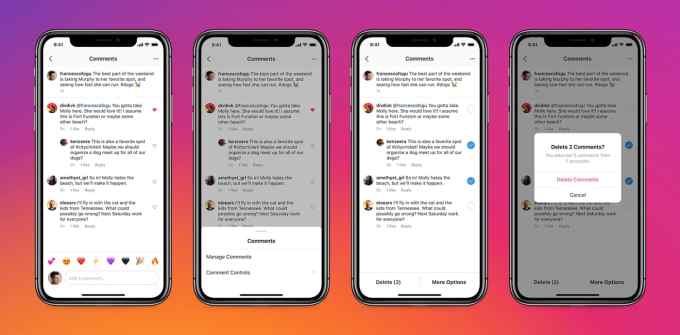
As part of its anti-bullying efforts, Instagram this week announced a series of new features aimed at helping users better manage negative comments as well as highlight positive ones. It’s also adding new controls to manage who can tag or mention you on Instagram, which can be another source of online bullying. Among the new additions is a tool for deleting comments in bulk and another to restrict multiple accounts posting negative comments. Another gives users control over who can tag them. The features are meant to help users rein in bullies from getting their voices heard, but could also be used by brands and influencers whose businesses depend on not having any negative content associated with them — even if it’s valid criticism.
Telegram abandons crypto project

Telegram, the operator of a messaging app used by 400 million, announced this week it’s giving up on a proposed blockchain network, the Telegram Open Network, due to a lengthy dispute with the SEC. Since October, the SEC has said Telegram’s $1.7 billion ICO in 2018 for its cryptocurrency Grams, was an illegal securities offering.
“Today is a sad day for us here at Telegram . We are announcing the discontinuation of our blockchain project,” wrote Pavel Durov, Telegram’s founder and chief executive. He went on to explain the situation and rant against the SEC, which wasn’t even allowing it to distribute tokens to non-U.S. investors. “This court decision implies that other countries don’t have the sovereignty to decide what is good and what is bad for their own citizens. If this doesn’t make sense to you, you are not alone.”
The announcement was a surprise because, as of last month, Telegram was promising investors a return of 110% of their original investment if it could keep their money until April 2021.
Maple Media is hunting for app acquisitions
Maple Media is on the lookout for more app acquisitions, TechCrunch’s Jonathan Shieber reported this week. The LA-based startup has over the years created a portfolio of roughly 30 companies and 100 apps in its quest to become the IAC of app store businesses and is now looking to spend as much as $50 million in 2020 to buy companies and apps that will have a lasting resonance with a certain audience, whether it’s a utility like a calendar, or a game like Sodoku. Already, the company owns a number of app brands, including We Heart It, Pic Stich, NOAA Weather Radar, Player FM WeekCal, Tony Hawk’s Skate Jam and others.
Apple releases watchOS 6.2.5 to developers
One week after the fourth Apple Watch beta arrived, Apple rolled out the next version, watchOS 6.2.5. The releases don’t include any notes about what changed, but this close to WWDC 2020, they’re likely about smaller tweaks such as bug fixes and performance improvements, not major new features.
Quibi blames coronavirus, not its content or format, for everything
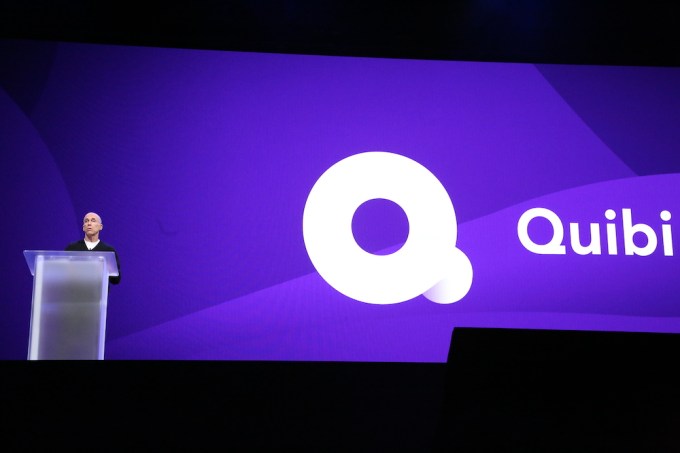
Image Credits: CES
Quibi’s short-form video app has achieved 3.5 million downloads and 1.3 million active users in just over a month. Those are good numbers, generally speaking, but for an app with $1.8 million in funding and a slew of Hollywood A-Listers participating, it’s an underwhelming start.
“I attribute everything that has gone wrong to coronavirus,” Katzenberg said in an interview with The New York Times, published this week. “Everything. But we own it.”
The company is rushing to release features that will allow people to watch Quibi content on their TV, due to the coronavirus outbreak where the app now competes with everything else we’re bingeing in long hours spent at home. But this won’t solve Quibi’s problems. The company fundamentally doesn’t understand that the coronavirus pandemic was only one issue. The other is that the app wasn’t really filling a need — we have plenty of things to do on our phone in down moments, including watching Netflix for five minutes then hitting pause when the break is up.
But more importantly, Quibi shows are just not good, despite their star power. The shows have rebooted, remixed or distilled trusted TV formulas into unrecognizable shapes. Netflix may pump out its B-side copycat shows, but at least we understand the bargain we’re getting there. (e.g. for much less than cable, we can watch “Next in Fashion” instead of “Project Runway,” or dating game trash like “Love Is Blind” instead of “The Bachelor.”)
Quibi, however, acted like a mad chemist in the TV show formula factory. Its house makeover show is set at the sites of grisly murder crime scenes. Its home-cooking reality competition shoots food out of cannons at contestants who then pick it off their body and the floor to figure out what they have to make. Its Judge Judy-like show with Chrissy Teigen makes a mockery of courtroom reality, having not realized the formula worked because people are funny on their own — they didn’t need a comedian to spice things up.
Funding & M&A
- Apple acquired VR broadcasting startup NextVR for a rumored $100 million. Everyone is now wondering why, given Apple’s more public embrace of AR. The investment could point toward a future mixed-reality device or glasses, further down the road.
- Facebook acquired Giphy in $400M deal. Giphy has evolved into a central source for high-engagement content and sharing. Google in 2018 had bought Giphy rival Tenor.
- Mobile marketing platform AppLovin acquired Machine Zone, maker of “Game of War: Fire Age” and “Mobile Strike,” in its biggest deal to date. The company has been making strategic investments in gaming studios for the past couple of years. Terms were not revealed.
- Clubhouse, a voice-based social app that’s not even open to the public, raises at least $10M from Andreessen Horowitz and others. Deal values the startup at $100M. This seems fairly optimistic.
- Mobile psychology and hypnotherapy app Mindset Health raised $1.1 million from Fifty Years, YC, Gelt VC, Giant Leap VC and angel investors across the U.S. and Australia.
- ANNA, a U.K. business account and tax app for SMBs, raised $21 million. The funds came from a single source: the ABHH Group, the sometimes controversial owner of Alfa Bank in Russia, the Amsterdam Trade Bank in the Netherlands and other businesses.
- Podcasting startup Luminary Media raised $30+ million in a new round valuing the business below its 2019 valuation of $200 million, according to Bloomberg.
- Fantasy sports app Sleeper raised a $20 million Series B led by Andreessen Horowitz. The app has expanded into esports due to coronavirus cancellations of real-world sports.
- Mobile-first platform for maintenance and operations collaboration, UpKeep, raised $36 million Series B led by Insight Partners.
- Online and mobile ordering platform for pizzeria chains, Slice, raised $43 million Series C led by KKR.
- Vochi, a computer vision-based video editing app, raised $1.5 million for its TikTok feeding machine.
- Newton Mail acquired by fans. Beloved email app Newton Mail, which was bought from Essential — which had acquired the app’s maker CloudMagic in 2018 — was saved by fans. New owners, Maitrik Kataria and Justin Mitchell, announced this week via a blog post they’ve bought the app and have plans to help it stick around.
Downloads
Twobird
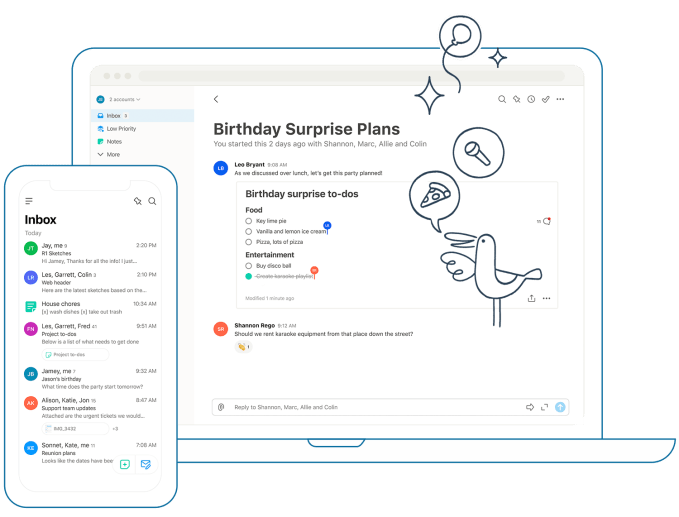 Twobird is a new collaborative email app from the developer of Notability. Launched this week after running in beta for half a year, the app offers a clean, simplified inbox with tools to automate clearing out emails and unsubscribing. But its biggest selling point it how it combines collaborative notes and to-do lists in line with emails. This puts it in competition with modern productivity apps like Slack, thanks to its use of things like @-mentions, reactions and threaded comments, instead of back-and-forth emails, noted The Verge in a review.
Twobird is a new collaborative email app from the developer of Notability. Launched this week after running in beta for half a year, the app offers a clean, simplified inbox with tools to automate clearing out emails and unsubscribing. But its biggest selling point it how it combines collaborative notes and to-do lists in line with emails. This puts it in competition with modern productivity apps like Slack, thanks to its use of things like @-mentions, reactions and threaded comments, instead of back-and-forth emails, noted The Verge in a review.
Microsoft Family Safety
Microsoft this week launched a new app, Family Safety, aimed at parents managing their children’s screen time. The app allows users to set screen time limits, track phone usage, enable content controls on the web share their location with other family members and more. The app is available in a limited preview on iOS and Android.
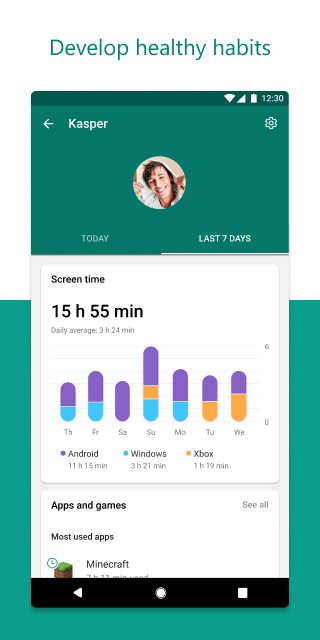
The timing of the app’s arrival is interesting. During quarantine, many parents have given up on enforcing screen time, having made the sin a new survival tool. Before the pandemic, an entire industry had sprung up around the idea that smartphone addiction and excessive use should be avoided, but when everything else is taken away — there are only so many hours in the day you can walk in the woods, after all — screens are what’s left. Burned-out parents have given up, and who knows when they’ll again care about those extra 30 minutes little Timmy wants to spend gaming on his tablet.
Headspace
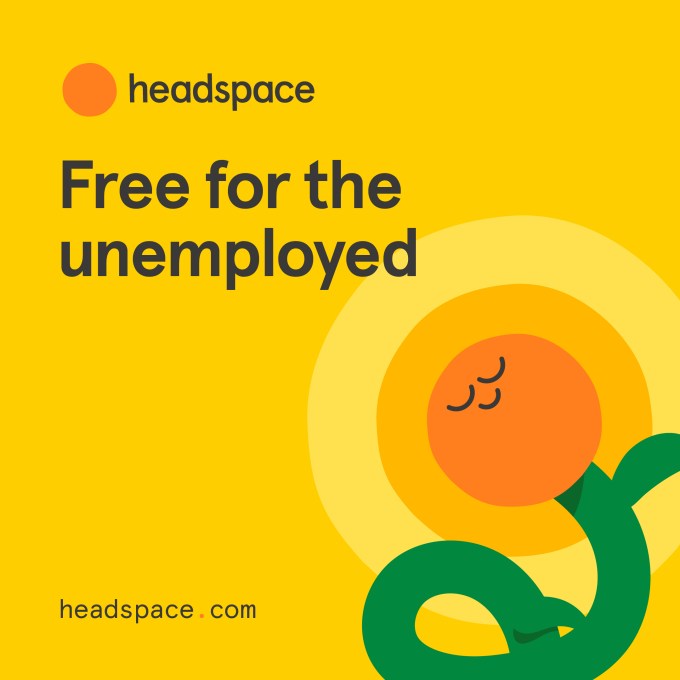
Headspace is doing some good-slash-capitalizing on the staggering amount of anxiety triggered by the coronavirus pandemic. The company this week announced it’s making its meditation app free to all unemployed Americans, in addition to COVID-19 front-line workers. It’s worth a download for those who meet the app’s requirements, but it also seems like a fairly crass marketing ploy to aim your app directly at those who are suffering in an effort to gain more users.
If Headspace wanted to do something good amid the pandemic, it should have opened up a selection of its content for free, specifically focused on people dealing with anxiety or sleeplessness. After all, everyone — not just front-line workers or the unemployed — are suffering right now and apps like Headspace and its competitors can help. Headspace could still gain more users and subscribers by announcing a free offer that’s open to all, instead of positioning itself like a modern-day mobile ambulance chaser ready to bask in the glow of good PR amid widespread human tragedy.
DisneyNOW
DisneyNOW, the app everyone used to watch Disney TV before there was Disney+, was updated this week with the introduction of a new in-app game, “Mickey & Minnie’s Runaway Railway: Adventure Kit.” This AR experience allows kids to control Mickey and friends’ cars and trains through scenic attractions, virtual objects and more. Kids can even create their own ride and watch the cars move in AR in their own home.
Gardenscapes
Hear me out.
The second most-downloaded game worldwide in April, Gardenscapes, has been hitting new milestones. Its parent company, games publisher Playrix, has now surpassed 1.1 billion in downloads across its portfolio, led by Gardenscapes’ nearly 324 million downloads, according to Sensor Tower. The publisher is gaining a surge of new downloads due to the COVID-19 pandemic, generating Playrix more than $200 million in consumer spending in April.
So what makes Gardenscapes a quarantine hit? For starters, it’s a free-to-play game that’s now using the time-tested “Match 3” formula (like Bejeweled). (It began its life as a hidden-object game.) But Gardenscapes combines that formula with a narrative where you complete tasks to design and restore a beautiful garden to its former glory. That twist that has a touch of Animal Crossing: New Horizons to it, as both games involve moving through a storyline to beautify a space. There’s something comforting about being able to control a virtual world and make it better, when the real world is so out of whack.
Gardenscapes gives people a chance to enjoy a similar sense of accomplishment, without the deep investment of time and money (Switch isn’t cheap) that comes with involving themselves a metaverse like AC: NH.
